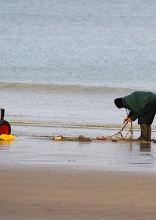
VLIZ's latest policy informing brief examines the impact of the corona measures on Belgian recreational sea fishing. It is a first exploration of the socio-economic and ecological (catch reduction) effects of a 47-day fishing ban during the lockdown. A survey among Belgian recreational sea fishers examined the personal perception of how the pandemic affected the marine environment, their fisheries-related expenditures and their health. Attention was also paid to demographic (age, gender, etc.) and social (income, employment, education, etc.) impacts, as well as to personal preferences (e.g. target species, self-consumption rate, etc.). This survey is an initiative of the University of Santiago de Compostela (Spain) and is part of an international research project. In addition, based on the detailed recreational catch data of the Belgian monitoring programme for recreational sea fishing (see Verleye et al. 2019), it was calculated how much fish and shrimp would have been caught if no fishing ban had been declared between 18 March and 3 May 2020.
The survey indicates a slight reduction in the general feeling of well-being and sleep quality among fishermen. In addition, they appear to be mainly concerned about their own health and that of close family members. Confidence in job and financial security also decreased and (temporary) unemployment within the active population among the respondents increased from 6% (pre-lockdown) to 32% (during lockdown). The demographic (age, etc.) and social (education, marital status, etc.) backgrounds seem at first sight to have little impact on how one feels, although there are strong individual differences that can be linked to a lesser extent to the social factors surveyed.
The economic loss during the lockdown, due to a reduction in direct expenditure, amounts to a minimum of 0.564 million euros. This amount does not take into account annual fixed costs (mooring, maintenance, etc.) and indirect revenues (e.g. commerce, employment, tourism). In addition, due to the variable nature of the measures (with gradual easing) and the possible personal reluctance to go fishing again, the economic losses will also manifest themselves for a few months.
In addition to the socio-economic effects associated with the Belgian lockdown, the latter will logically also have an impact on catches for 2020. For example, recreational landings between 18 March and 3 May were reduced by almost 18 tonnes (i.e. 6% of the total annual recreational landings based on catch data for 2018). The most notable reductions in catches are for cod (-5.3 tonnes), whiting (-4.6 tonnes) and dab (-3.4 tonnes). This reduction in catches represents only a fraction (0.2%) of the total catch (commercial and recreational) in the Belgian part of the North Sea (BPNS) in a normal year. They are therefore negligible in view of variations in commercial fishing activity (-33% sailing intensity between February and April 2020; Verleye et al. 2020; EMODnet Human Activities) in the BPNS on the one hand and natural variation on the other.
Plans are underway to further monitor and refine the evolution of these results within the framework of the Belgian monitoring programme for recreational sea fishing (www.recreatievezeevisserij.be).
The policy informing brief (Dutch, EN summary): De impact van de coronacrisis op de recreatieve zeevisserij - De socio-economische en ecologische effecten van de nationale coronamaatregelen op de Belgische recreatieve zeevisserij is available via the following link.
For more information on the brief or the monitoring programme:
Dr. Thomas Verleye (VLIZ): thomas.verleye@vliz.be